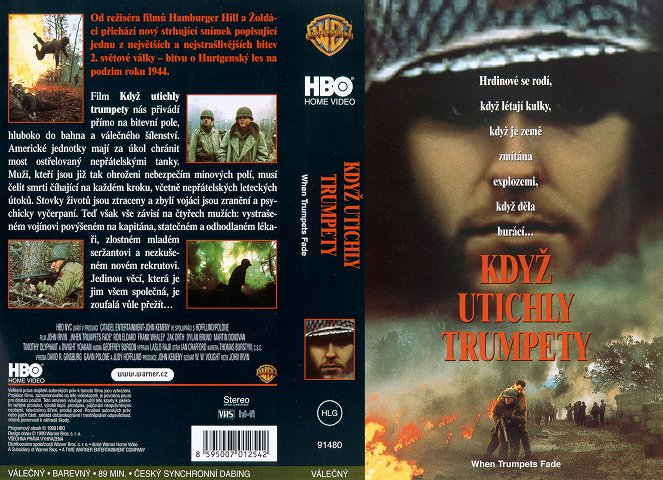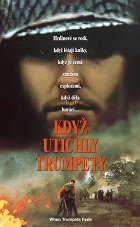Regie:
John IrvinDrehbuch:
W.W. VoughtKamera:
Thomas BurstynMusik:
Geoffrey BurgonBesetzung:
Ron Eldard, Zak Orth, Frank Whaley, Dylan Bruno, Devon Gummersall, Martin Donovan, Dan Futterman, Dwight Yoakam, Jeffrey Donovan, Timothy Olyphant (mehr)Inhalte(1)
Ende 1944. Die Alliierten stoßen auf erbitterten Widerstand der Deutschen. Die Schlacht tobt erbarmunglos. Der US-Soldat Manning rennt durch die Hölle, erlebt das Grauen. Feuerhagel, Schweiß und Blut sind die Ernten dieser Kriegstage – Gevatter Tod ein treuer Begleiter. Um diesen Irrsinn zu beenden, treibt ihn nur ein Gedanke weiter: Der Feind muß vernichtet werden – koste es, was es wolle zur Not das eigene Leben. (Verleiher-Text)
(mehr)Kritiken (3)
Eine angenehme Überraschung. Ein Kriegsfilm, der eine der Episoden der Ardennenschlacht beschreibt... Kein Heldentum, kein Pathos, kein furchtloser Held. Ron Eldard Manning ist ein egoistischer Mann, der sich nur um sein eigenes Überleben kümmert. Für diesen Preis ist er bereit, einen törichte Heldentat zu begehen... Der gute Eindruck des Films wird etwas getrübt durch die seltsame Musik und die Tatsache, dass die Geschichte keine Steigerung erfährt... Dennoch ist dieser Film wegen seines Themas (die Ardennenschlacht ist kein alltägliches Thema) und vor allem wegen seiner Darsteller interessant. Ein gutes Kriegsdrama ohne große Effekte und Massenszenen... Und auch ohne unnötig klischeehafte Ikonisierungen des alliierten Heldentums. Nur der Krieg und sein Dreck.
()
It's well known that the phrase “Nobody dies” is just a comforting lie. And so, they pull out a pack of cigarettes and light one up, even though they weren’t smoking the day before. The episode from World War II isn’t overly discussed, but it’s no surprise, given that the bloody maw of the Hürtgen Forest claimed over thirty thousand American soldiers in a few months. John Irvin's film is driven by authenticity, featuring a believable range of self-preserving characters that naturally evolve into heroic figures, and includes several scenes that will undoubtedly stick in one's memory (a few seconds of hell between anti-personnel mines, the “Dracarys” of the soldier Sanderson in eliminating a German gun, or the cathartic credits with dragon’s teeth and the Christmas Bing Crosby). Frank Whaley had the chance over four years to test whether it was harder to act as a lapidary behind the Siegfried Line or recall under Jules Winnfield’s pressure if Marsellus Wallace looks like that bitch. A tough choice.
()
A television film that is very close to the popular series Band of Brothers in terms of its quality. Similar is the unpretentiousness, absence of pathos, glorification of war, and American patriotism. The war, as portrayed by the director, is about the filth in the trenches, stress, fear, efforts to survive, lack of provisions, and sometimes even downright cowardice. The feeling of reality is valuable, but if I were to have any critical remarks, they would be directed toward the fact that even this honestly done work does not say much about the overall character of the war on the Western Front. It was very different from what soldiers experienced on the Eastern Front or the battle lines on the Asian continent. Similar bloody battles fought on the edge of a knife were a rarity from the perspective of Americans. American commanders, considering public opinion in the United States, sought to minimize casualties and did not seek personal contact between their units and the enemy. The war was decided by material and technical superiority, and the front moved forward only slowly after the enemy had been sufficiently decimated through systematic bombing and shelling. When Americans encountered a tenacious and well-motivated adversary, such as Kesselring's units in Italy, the advance of Allied forces was halted despite their significant superiority. As for the acting and directing aspects, I have no comments or criticisms about the film; it would be great if such a meticulous approach could be considered average in cinema. Overall impression: 95%.
()
Galerie (9)
Photo © Warner Home Video


Werbung